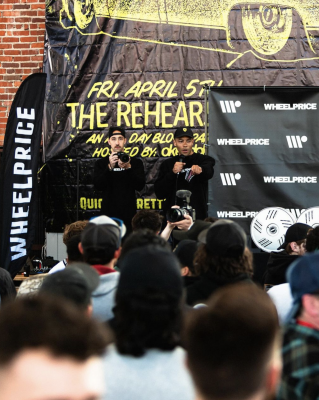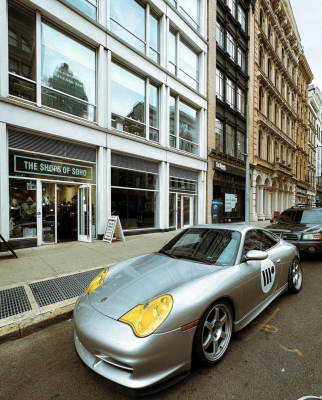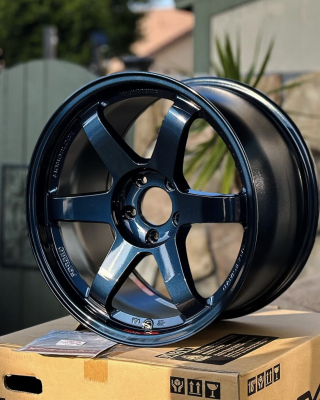Last week marked the exciting kickoff of CCEI’s Summer Fellowship program, where a dynamic cohort of ten innovative startup teams embarked on their entrepreneurial journeys within our center. In celebration and recognition of these teams, we’ll be spotlighting each venture throughout the summer — offering a glimpse into their unique missions, challenges, and overall progress.
To start, we’d like to introduce WheelPrice: a team poised to revolutionize the automotive market. A two-sided marketplace for car enthusiasts to buy and sell automotive parts, WheelPrice’s story is one of passion and perseverance.
CCEI’s Kate Savinelli was able to sit down with Wally Namane, co-founder and CPO of WheelPrice.
–
(Kate Savinelli): Tell me how you and your other co-founders met, and what spurred you to come up with WheelPrice.
(Wally Namane): So, the idea itself is a decade old. Kyle Mayers and I met in college at UConn through the love of cars. We both had classic, red BMWs, also known as the E30, also known as God’s Chariot. It’s one of the most beautifully designed cars ever. And funny enough, they were both red.
We were going to different car shows up and down the East Coast. We were broke college students — 21 years old — with these antique cars, and it was hard and expensive to modify your car. One day, on the drive back, we said:
“It’s so difficult to buy and sell wheels, or buy and sell car parts in general.”
We said it would be cool if there was a dedicated place to do it. This was in 2012, when Craigslist was prominent. Craigslist was the main place people went to try to get a deal.
We ended up going our separate ways, in terms of career. I studied Management Information Systems out of the UConn School of Business. I had a career at United Technologies, went through their leadership program, and then landed at OTIS Elevator.
Somewhere around 2018 or 2019, Kyle and I had a touch-base. We said: “No one has solved this car part buying problem yet!” By now, we were a lot smarter than before. We weren’t broke college students. That’s where WheelPrice was born. Through the passion of cars, experiencing the painpoint ourselves, and trying to do something for the community.
Kirk Vanderheijden is our ‘third musketeer.’ He’s been incredible during this journey in building our community. I always say Kirk has the ‘secret sauce.’ He has this layer of strategic to him that not a lot of creatives have. I met him through a car show I was going to go to in Maryland, H2Oi.

I feel like CCEI has so many startups that start when they’re in college. So, to hear that you had the idea, went out into the real world, began your career, and then started it? It’s a cool full-circle moment.
For sure, and we’re all UConn alumni!
For somebody who is just meeting WheelPrice for the first time, how would you describe it to them?
WheelPrice is a two-sided marketplace for car enthusiasts to buy and sell parts. Think StockX or Poshmark, but for car people. You look at these communities that have a lot of enthusiasm behind them. Sneaker resell industries — a multi-billion dollar industry. Watch collectors — a very enthusiastic community of people who love to talk about watches, the history, and the provenance associated with watches.
The same characteristics and trends that we’ve seen in some of these adjacent marketplaces also exist in the automotive community. Yet, there’s no place for this community to thrive and exist. It’s very distributed.
That’s really the long-term vision of WheelPrice. Yes, it’s a marketplace. Yes, you can buy and sell parts. But we’re going beyond that. For us, that’s what makes us defensible. We have a community that loves everything we’re trying to do.
Has there been any significant obstacles that you guys have faced thus far?
Starting the marketplace is really, really hard. Starting a business in general is hard. What we’ve learned is starting a marketplace is like starting two businesses at the same time.
You have this ‘chicken or the egg’ problem. Buyers won’t come if there’s no sellers, and sellers won’t list if there’s no buyers. Andrew Chen actually was popular for the book he wrote. He talks about how sometimes you have to buy the chicken, and sometimes you have to buy the egg.
So that’s one challenge that we’re learning — how to sustain supply — especially as we grow. What I’m learning as well is that we have to do a better job on increasing supply. We have a hypothesis right now on how many listings a buyer needs to see before they say: “Oh, I want this variety.”
So, if you were going to shop for a new handbag, how many handbags do you need to see before you’ve decided? Is it five? Is it ten? Twenty?
Once you’ve decided what you want, then it becomes a matter of where it is located. What’s the price? And you have to have a lot of supplies in order to do that. Right now, that’s a big challenge we’re trying to work through.
We’re fully bootstrapped right now, and a lot of marketplaces that have been successful say you need this institutional capital to really ‘do this right’ — to really blow up and and be the go-to place. That’s something we’re trying to think through as well.
Well, maybe Summer Fellowship can help you out a little bit in that department!
Yeah, exactly. When we did the interview process for Summer Fellowship, Alycia noted: “You went through TechStars. Why do you need us?”
I said: “Well, you know, TechStars was incredible. We’ve learned so much through them, and I will forever be grateful for all the things that I learned, especially coming from the corporate world where I knew nothing about startups or ventures. But there’s still things that we don’t know.”
And I think [CCEI is] going to help us tweak some of those things, especially around monetization, and go-to-market.
What has been some goals that you guys have hit, or milestones? What are you proud of?
I’ll give an example of a recent one that wasn’t necessarily a goal, but something we were proud of. On two separate occasions, we received photos of these beautiful Porsche 911s. Two separate guys had wrapped their car with our logo. Which was insane! They’re six figure cars, and right in center is the WheelPrice logo.
The fact that these people felt so inclined to put a brand we’ve built on his car was amazing. If you think about our competitors — eBay, for example — I don’t know many people who would put an eBay sticker on their car.
One company I look up to is Liquid Death. They’re selling water — the most mobilized thing in the world. But the CEO isn’t talking about the type of water. It’s the fact that it’s in an aluminum can, and it’s the branding they’ve built.
I think we’re betting big on that. We’re betting big on people really loving the vision and loving what we’re doing.

The second milestone is that we just hosted our first ever show with BBS Wheels in Georgia at their North American headquarters. BBS in the automotive world is like Nike. In my opinion, I don’t know if it gets any higher than BBS — they’ve been around forever. They currently have a contract for providing the NASCAR wheels, as well as the wheels for Formula One.
They selected us to be ‘wheel judges’ for them at the show. It was incredible to build a relationship with them. Craig Donnelly and Jesse Hemans are incredible guys, and really passionate about the product. And they’re car guys, at heart. It reminds me of Kyle, Kirk, and I.
Hopefully, we’re going to do more things with BBS. They’ve been super helpful, especially as we just launched WheelPrice auctions. Right now, we have a set of wheels created in Italy by BBS in their Italian factory, which no longer exists. It was a very bespoke collaboration between BBS and Pininfarina. These guys built some of the most iconic vehicles, specifically with Ferrari. We have a set being auctioned off. To me, that’s really what WheelPrice is about. We’re giving an opportunity for people to own something that has heritage and significance.
For anyone who has looked WheelPrice up, they can see you’re pretty popular on social media channels. You have 35,000 followers on Instagram, and 28,000 followers on TikTok. How did you get to that point?
It’s definitely been a grind. I will say, we worked hard for each and every follower, and we wanted to make sure we were being authentic. If you’re serious about building community, you have to do it the real way. You have to do stuff that resonates with people, and you have to be fast. You have to be witty.
We spend a lot of time having conversations between the three of us — literally daily. We’re always putting ourselves in the other person’s shoes and trying to figure out how content is going to be received. We’re very careful with that. Especially in the beginning, we were so corporate. I think it’s important for companies to get the tone right when they start out. Once you figure out your tone, you can lean into it.
We’ve had several pieces of content go viral — I won’t say we’ve cracked the code, but there’s a blueprint. It’s also important to be a thought leader. Your [company’s] page can have certain thoughts on certain things that are happening. That’s what gets people convinced to follow you. It has to be entertaining, or informational.
A piece of advice I would give to other founders trying to grow their social channels — and we struggled with this in the beginning — is not spending so much money on creating content. Don’t get me wrong — you may have to in some regards. For us, it’s going out to car shows. We have to be with the community to get content.
But there’s other ways to do it, too. You could ‘remix’ something happening in your community, and create content off of that. That’s free, and that’s how one of our biggest videos blew up.

Has WheelPrice participated in any other accelerator programs, or maybe showcases? I know you mentioned TechStars.
The TechStars cohort that we went through was the Atlanta one. They have a lot of different focus areas. It was great for us to tap into their network. To this day, Michael Rock is one of our advisors, and he’s been an incredible resource to help us think through things, especially coming from a company of that size.
Being in the Atlanta area was awesome, too. It‘s an incredible business community. Some of these other tech-startup-focused initiatives are different from Connecticut. That’s why I said: “Kyle, we have to do CCEI, because there’s not a lot of tech stuff happening in Connecticut.”
I also want to shoutout Startup Westport. They just launched in January, I think, and Peter Propp was one of the people leading that initiative. I had just come back from Atlanta, and I remember feeling like there was no one to talk to about tech. I was hungry for something, and Startup Westport wasn’t too far from me. Peter’s a great guy, so shoutout to Peter, and that whole crew at Startup Westport. I love what they’re doing.
They just launched a mentor program. So, I signed up as a mentee, and again, going back to being coachable and teachable — we don’t know everything. I got paired with Marc Frankel, who used to be an employee at Palantir Technologies, and just launched his own company: Manifest. He’s been an incredible resource for me to bounce ideas off of.
I’m curious if you have other team members right now. Is it just the three of you?
Just the three of us. We have a software team we’re using, but they’re not WheelPrice employees.
However, I am excited to announce we have four interns joining us this summer. Which again, is crazy for us. It’s funny — one of the prerequisites was that you have to be into cars. We’re excited to get them excited, and get them established in WheelPrice.
If somebody wants to learn more about WheelPrice, where should they go, and who should they get in contact with?
Super easy: wheelprice.com. And if you really love WheelPrice, you’ll download the app on iOS and Android. If you want to have a conversation, wally@wheelprice.com. My DM’s are always open. My email is always open.